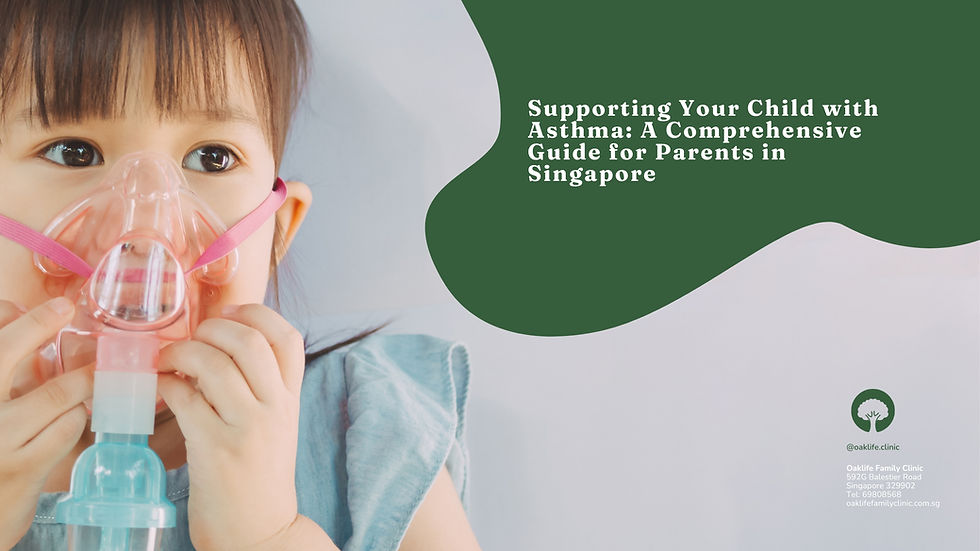A Comprehensive Guide for Parents: Asthma Care for Children in Singapore
- Oaklife Family Clinic
- Nov 27, 2024
- 4 min read
Asthma in children is a common yet often challenging condition to manage. If you’re a parent of a child with asthma, you’re not alone. According to the World Health Organization, asthma affects 262 million people worldwide and is one of the leading chronic conditions in children globally. In Singapore, one in five children are diagnosed with asthma, making it a common health issue that requires ongoing care and awareness.

Asthma causes the airways to swell and narrow, making it difficult for children to breathe. Although it’s not curable, asthma can be well-controlled with proper management, allowing children to lead full, active lives. Here’s a detailed guide to understanding asthma in children and how you can best support them.
What is Asthma?
Asthma is a chronic respiratory condition where the airways in the lungs become inflamed and narrow, causing difficulty in breathing. Symptoms include wheezing, shortness of breath, and coughing—especially during physical activity, cold weather, or at night.
Dr Daniel Lim, Oaklife Family Clinic’s experienced family physician, explains, “Asthma in children varies widely, from occasional symptoms triggered by a cold to more frequent episodes that need regular attention. But with personalised care and close monitoring, most children can enjoy a healthy and active life.”
Recognising Asthma Symptoms in Children
Identifying asthma in young children can sometimes be challenging, as symptoms like coughing and wheezing may resemble other conditions.
Here are some signs to watch for:
Frequent coughing that worsens at night, with physical activity, or during laughter.
Wheezing or whistling sounds when breathing, especially when exhaling.
Shortness of breath or chest tightness that might limit activity.
Fatigue or irritability during or after play due to breathing difficulties.
One of our patients, a 6-year-old girl named Ellie, experienced frequent nighttime coughing and breathlessness after running. Her mother initially thought it was just part of a cold, but after noticing a pattern, they visited Oaklife Family Clinic. With a few key adjustments and regular check-ins, Ellie now manages her symptoms well, even playing her favourite sport, football.
Asthma Triggers to Watch For

Understanding your child’s asthma triggers is essential to help avoid flare-ups. Common triggers include:
Allergens like dust mites, pollen, and pet fur.
Cold air or changes in weather that can irritate the airways.
Viral infections such as the flu, which can worsen asthma.
Exercise-induced asthma, which is common in children but manageable with proper treatment.
Treatment Options for Children with Asthma
Managing your child’s asthma often involves a combination of preventive measures, medication, and lifestyle adjustments. Treatment typically includes:
Inhaled corticosteroids – The most common form of preventive treatment, these medications reduce airway inflammation.
Rescue inhalers – These provide quick relief from sudden asthma symptoms during a flare-up.
Preventive asthma action plan – Working with a healthcare provider to develop a personalised plan for recognising symptoms, avoiding triggers, and using medication as directed.
“Asthma care in children focuses on keeping symptoms at bay with preventive measures and empowering parents with knowledge. When handled well, it can greatly reduce the impact of asthma on your child’s daily life.” Dr Daniel Lim, Oaklife Family Clinic
Lifestyle and Asthma Care Tips for Parents and Children
Helping your child stay active and healthy involves a few practical steps:
Track symptoms and triggers
Using an asthma diary to note down triggers and symptom patterns can be helpful.
Create a healthy home environment
Reduce exposure to allergens by keeping the house dust-free, using air purifiers, and limiting pets if necessary.
Encourage exercise with caution
Asthma shouldn’t prevent kids from being active. With proper precautions and pre-exercise medication if advised by a doctor, most children with asthma can enjoy sports and play.
FAQ: Asthma in Children
Q: How can I tell if my child’s cough is due to asthma?
A: Look for patterns, such as coughing that worsens at night, after exercise, or in cold air. If it’s persistent and comes with wheezing or shortness of breath, consult a doctor.
Q: Is asthma genetic?
A: While asthma isn’t directly inherited, children with a family history of asthma, allergic rhinitis or eczema are more likely to develop it.
Q: Can my child outgrow asthma?
A: Some children experience fewer symptoms as they grow older, but asthma can persist into adulthood for others. Regular check-ups are important to adjust treatment as your child grows.
Q: Are there long-term effects of asthma medication?
A: Asthma medications, particularly inhaled corticosteroids, are safe and effective for children when used as prescribed. It reduces airway swelling and mucus production in the lungs hence preventing asthma attacks.. The side effects of inhaled corticosteroids are minimal. Most common side effect is oral thrush. Rinse your mouth after using inhaled corticosteroid to avoid this.
Q: How can I best prepare my child for sports activities?
A: Consult your doctor about using a rescue inhaler before activity. With proper management, many children with asthma lead active lives and excel in sports.
Helping your child manage asthma requires knowledge, planning, and regular medical support. With the right approach, your child can lead a healthy, active life. If you have any questions or concerns about asthma in children, Oaklife Family Clinic is here to provide compassionate and comprehensive care tailored to your family’s needs.
Let’s work together to support your child’s health and well-being!




